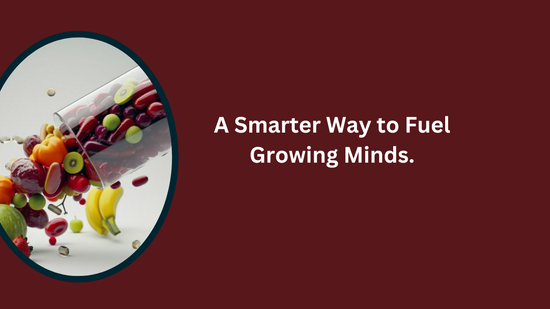Everyone, regardless of age or dietary preference, can see benefits from Vitamin B12 and D3. Here's why:
- Vegans and Vegetarians: Since plant-based diets often lack sufficient B12 and D3, supplements are essential to prevent deficiencies that can lead to issues like anemia and weakened bones.
- Older Adults: As we age, our bodies become less efficient at absorbing B12 and synthesizing D3 from sunlight. Supplements can help maintain cognitive function, bone health, and overall well-being.
- Children: Adequate intake of D3 is crucial for healthy bone development and immune function, while B12 supports proper neurological growth. Supplements ensure children get the necessary nutrients for optimal development.
- Men and Women: Both vitamins play key roles in energy production, immune support, bone health, and mood regulation. Supplementation helps meet these needs, especially when dietary intake is insufficient.
In summary, B12 and D3 supplements are beneficial for everyone, helping to ensure that all individuals receive these essential nutrients for maintaining good health and preventing deficiencies.
Risks of NOT taking Vitamin B12 D3
- Anemia: A deficiency in B12 can cause megaloblastic anemia, characterized by large, abnormal red blood cells, leading to symptoms like fatigue, weakness, and shortness of breath.
- Neurological Issues: B12 is crucial for nerve health. Deficiency can result in numbness, tingling in the hands and feet, memory problems, and difficulty concentrating.
- Cognitive Decline: Long-term B12 deficiency can contribute to cognitive decline and an increased risk of neurodegenerative conditions like dementia.
- Bone Health Issues: Essential Vitamin for calcium absorption is vitamin D3. Deficiency can lead to weakened bones, increasing the risk of fractures and conditions like osteoporosis and rickets (in children).
- Immune System Dysfunction: D3 plays a role in immune function. Deficiency can make the body more prone to infections and may contribute to diseases.
- Cardiovascular Problems: Low levels of vitamin D3 have been associated with an increased risk of cardiovascular diseases, including hypertension and heart disease.
- Mood and Mental Health Issues: Vitamin B12 and D3 are linked to mood regulation. Deficiency can invite depression and anxiety.
- Increased Risk of Chronic Diseases: Insufficient vitamin D3 levels have been associated with an increased risk of chronic diseases like diabetes and certain cancers.
Symptoms of vitamin B12 and D3 deficiency:
|
Deficiency of Vitamin B12 |
Deficiency of Vitamin D3 |
|
Fatigue and weakness |
Fatigue and tiredness |
|
Anemia |
Muscle weakness or aches |
|
Numbness in the hands and feet |
Increased risk of fractures |
|
Difficulty walking or balance problems |
Bone pain and lower back pain |
|
Depression or irritability |
Depression or irritability |
|
Shortness of breath and dizziness |
Impaired wound healing |
|
Pale or jaundiced skin |
Increased susceptibility to infections |
|
Memory loss and cognitive decline |
Hair loss |
Which food can provide vitamin B12 and D3?
These vitamins are primarily found in animal products or are synthesized through exposure to sunlight:
|
Source of B12 |
Source of D3 |
|
Poultry and Meat : Beef, liver, chicken, and turkey |
Fatty Fish: Salmon, mackerel, tuna, and sardines |
|
Fish and Seafood: Salmon, trout, tuna, clams, and sardines |
Fish Liver Oils: Cod liver oil |
|
Dairy Products: Milk, yogurt, and cheese. |
Egg Yolks: Although in smaller amounts |
|
Eggs: Particularly the yolk. |
India has ample amount of sunlight, so why are people facing deficiency in vitamin B12 and D3?
Despite sunlight exposure, many people in India spend significant time indoors, reducing their opportunities for sunlight exposure needed for Vitamin D synthesis. High levels of air pollution also block UVB rays, further limiting Vitamin D production. Cultural practices that involve covering most of the skin and geographical variations in UVB intensity also contribute to lower Vitamin D levels.
For Vitamin B12, the issue lies primarily in dietary habits. A large portion of the population follows vegetarian diets that lack adequate animal-based sources of B12. Even those who consume animal products may face absorption issues due to gastrointestinal conditions or economic factors limiting access to fortified foods. Consequently, despite abundant sunlight, these combined factors contribute to the ongoing prevalence of Vitamin D3 and B12 deficiencies in India.
Why is Vitamin D3 is essential for working people
Vitamin D3 is essential for working people due to its significant impact on overall health and productivity. It aids in calcium absorption, which is crucial for maintaining strong bones and preventing conditions like osteoporosis, reducing the risk of fractures, and supporting those with physically demanding jobs.
Additionally, Vitamin D3 supports muscle function, helping prevent weakness and reducing the risk of injuries and falls. Its role in boosting immune function is also vital, as a strong immune system helps minimize sick days and maintains productivity. Moreover, adequate Vitamin D3 levels contribute to better mood and cognitive function, combating fatigue and depression, and enhancing focus and job performance. Overall, Vitamin D3 is integral to physical and mental well-being, supporting bone health, muscle strength, immune defense, and energy levels, all of which are crucial for effective and sustained work performance.
Why take supplements for vitamin B12 and D3?
Taking supplements for Vitamin B12 and D3 can be highly beneficial, especially when dietary intake or natural production is inadequate. Vitamin B12 supplements are crucial for individuals with restricted diets, such as vegetarians and vegans, who may not obtain sufficient B12 from their food. Similarly, Vitamin D3 supplements are important for those with limited sun exposure or absorption issues, helping to maintain optimal calcium levels for bone health and preventing conditions like osteoporosis. Both vitamins play roles in supporting muscle function, immune health, and mood regulation. Supplements provide a direct and effective way to address deficiencies, improve overall health, and ensure that essential nutritional needs are met.
FAQs related to Vitamin B12 and D3
- What is Vitamin B12, and why is it important?
Vitamin B12 is essential for red blood cell formation, neurological function, and DNA synthesis. It helps in maintaining healthy nerve cells and supports energy production.
- What is Vitamin D3, and why is it important?
Vitamin D3 is a fat-soluble vitamin that helps the body absorb calcium, which is crucial for maintaining strong bones and teeth. It also supports immune function and overall health.
- Deficiency of Vitamin B12, Who is at risk?
People at higher risk include vegetarians and vegans (as B12 is primarily found in animal products), older adults (due to decreased absorption), and individuals with certain medical conditions like gastrointestinal disorders.
- Deficiency of Vitamin D3, who is at risk?
People with limited sun exposure, those living in higher latitudes, individuals with darker skin, and those who spend most of their time indoors are at higher risk. Additionally, older adults and people with conditions affecting absorption are also at risk.






